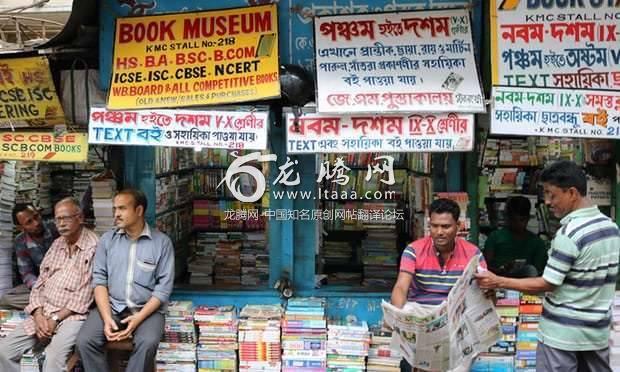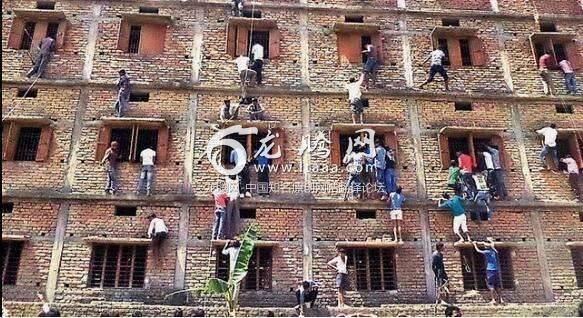【卫报】随着考试季的到来,印度的“作弊党”开始行动 [英国媒体]
在一个进入大学和找到工作的机会都十分有限的国家里,想要在竞争中领先他人的绝望的学生和家长带来了巨大的网络收益。
India's 'cheating mafia' gets to work asschool exam season hits
随着考试季的到来,印度的“作弊党”开始行动
Vast network profits from the desperationof students and parents to get ahead in a country where university places andjobs are limited
在一个进入大学和找到工作的机会都十分有限的国家里,想要在竞争中领先他人的绝望的学生和家长带来了巨大的网络收益
Men at stalls selling schoolbooks onCollege Road in Kolkata at the height of India’s annual exam season Photograph:Michael Safi
在印度的年度考试高峰期,一个男人在加尔各答的学院路边的一个书报摊上贩卖教科书 图片:Michael Safi
A few minutes into the final year mathsexam at his Delhi high school, Raghav asked to use the bathroom. Inside, hetexted pictures of the test paper he had secretly photographed to a phonenumber he was sent days before. Minutes later, answers materialised on thescreen.
刚刚进入数学年终考试考场几分钟,德里高中的拉贾夫要求去厕所。在卫生间里,他把偷偷拍下来的考卷照片发给一个他几天前获得的电话号码。过了几分钟,答案浮现在手机屏幕上。
“It isn’t cheating,” insists his motherSunita, who paid 16,000 rupees (£175) for her son to obtain the phone number.“It’s a way out.”
“这不是作弊,”拉贾夫的妈妈苏妮塔坚持说,她花了16000卢比(175英镑,约合人民币1548元-译者注)为儿子买到了这个电话号码。“这是我儿子的一条出路。”
India’s annual exam season has gripped thecountry in the last month, with tens of millions of students undertakinggruelling tests to qualify for the limited slots available at Indianuniversities – the best of them with admission rates about one-tenth those ofOxford and Cambridge.
上个月,印度的年终考试让整个国家都紧张起来,几千万名学生要经过痛苦的测试才有机会通过那条上大学的独木桥——最好的大学的录取率仅有牛津和剑桥大学的十分之一左右。
Also hard at work is the country’sso-called “cheating mafia”, the vast network aimed at profiting from thedesperation of students and parents to get ahead in a country where, each year, anestimated 17 million people join a workforce adding only 5.5m jobs.
同样努力的还有这个国家的所谓“作弊党”,这个巨大网络的目标是从想要取得领先优势的绝望的学生和父母那里获得收益。在这个竞争激烈的国家,每年有大约1700万人争夺550万个工作岗位。
Last week, in the latest high-profilebreach, the papers for two secondary exams were foundto have been leakedon WhatsApp about 90 minutes before the tests.More than 2.8 million students in Delhi and the surrounding areas have beenordered to resit the exams later in April.
上周发生了最新的一次高调泄密,两场二级考试的考卷在开考前90分钟被泄露到WhatsApp上。德里和周边区域的超过280万考生被要求在四月重新考试。
“It is mental torture,” said Kirath Kaul,15, an east Delhi student who will be forced to sit a new maths exam thismonth. “I was spending all day study [for the last one] and even getting up atnight to prepare.”
“这是精神折磨,”15岁的吉拉特·考尔说。这名来自东德里的学生被要求在这个月参加一场新的数学考试。“(为了这场新的考试)我整天都在学习,甚至晚上都会起床学习。”
‘A broken education system’
“崩坏的教育系统”
Cheating on exams in India is endemic,organised and elaborate. In Bihar, one of the poorest states in the country,more than 1,000 students were expelled for cheating in February.
考试作弊在印度是一个全国性的、有组织且精密的行为。在印度最穷邦之一的比哈尔,二月份有超过1000名学生因作弊被开除。
Last year, the student who topped the statein one subject, arts, turnedout to be a 42-year-old man. The student with the highest arts scorein 2016 was stripped of her certificate after arousing suspicions, including bytelling a TV interviewer she believed political science was thestudy of cooking.
去年,取得全邦考试艺术科第一名的是一位42岁的男人。2016年的艺术科状元在遭到作弊质疑后被取消了成绩,比如她曾在电视采访中说她认为政治学是一门关于烹饪的学科。
Relativesscale buildings to help Indian students cheat on exams
亲属们爬上考场外墙来帮助印度学生考试作弊
In 2015, Bihar made global headlines whenvideos emerged showing parents literally scaling a five-storeybuilding to pass answers to their children taking exams inside. This year, toensure probity, the state installed CCTV cameras in exam halls and made everystudent leavetheir shoes and socks at the door.
2015年,一段视频让比哈尔邦名声大噪,登上世界各国新闻头条。视频显示学生家长们爬上五层高的教学楼外墙,给里面考试的孩子递答案。今年,为了保证考试的真实性,比哈尔邦在考场里安装了监视摄像头,并且要求学生将鞋袜脱下留在考场外。
“This is very much the sign of a brokeneducation system,” says Yamini Aiyar, the chief executive of the Centre forPolicy Research.
“这就是教育系统崩坏的明显标志,”政策研究中心的执行总裁亚米妮·艾雅尔说。
She blames the widespread fraud on acocktail of intense pressure to earn a university qualification and a systemthat has been focused on building new schools, but unconcerned about whathappens inside them.
她将广泛存在的欺诈行为归咎于考大学的难度和只管建新校舍,不管教室里究竟在干什么的教育系统。
“Studies tell us that on average about halfof students that get to Standard 5 can read a Standard 2 text,” she says.
“研究发现,大概有一般的达到五级标准的学生只能读懂二级标准的文章,”她说。
Incentives for teachers and administratorsare also askew, she adds, measuring success and doling out promotions based onwhat percentage of children in a school or district are passing their exams.Officials are incentivised either to assist in the cheating or overlook it.
她还说,校长和老师们的目标也扭曲了。他们将衡量成功和获得升职的标准定为学生们通过学校或者地区考试的百分比。政府官员也被鼓励支持作弊或者忽视作弊。
Sunita, who asked for her name to bechanged for legal reasons, came into contact with India’s “cheating mafia”through the exam coaching centre Raghav have been attending before his finalexams last year.
因为法律原因,苏妮塔要求使用化名。她通过考试培训中心联系上了“作弊党”。她的儿子拉贾夫在去年期末考试前在这里上过课。
“The teacher said, your son is very weakma’am,” she recalls. “My son was not interested in studying and I didn’t wanthim to repeat the year.”
“老师跟我说,夫人,您儿子的水平太差了,”她回忆道。“我儿子不喜欢学习,但是我不想让他留级。”
The private tutor offered to connect withsomeone who could send Raghav the answers for his economics and mathematicspapers. Nobody on either end of the phone would know each others’ identity. Shesigned up with four or five other families.
私人老师给了她一个联系方式,说这个人可以为拉贾夫的经济和数学考试提供答案。电话两端的人都不知道彼此的真实身份。苏妮塔和其他四五个家长都报了名。
“It is totally common,” she says. Andlucrative. “All of us probably paid this man about 60,000 rupees.”
“这太平常了,”她说。这也有利可图。“我们几个家长大概总共给了这个人60000卢比。”
India’s cheating industry has proliferatedalongside others kinds of organised fraud such as call-centre scams, and isdriven by a similar mentality, says Snigdha Poonam, author of a new book aboutthe ambition and guile of Indian youth.
印度的作弊产业已经跟着其他类型的有组织欺诈发展壮大,比如客服中心欺诈,而且动机类似。这是斯尼格达·浦南的观点,她刚写了一本关于印度年轻人的野心和诡计的新书。
Social mobility in India is improving,according to surveys. But not fast enough to match the expectations of ageneration reared on social media, western pop culture, and promises thatIndia’s time has finally come. “The same forces drive young Indians intoentering these economies built on fraud,” she says.
根据研究,印度的社会流动性已经在好转。但是对于由社交媒体、西方流行文化和印度时代已经到来的承诺喂大的一代人来说,社会流动得还不够快。“同样的压力驱使印度年轻人加入这些建立在欺诈之上的经济体,”斯尼格达·浦南说。
“[It is] the lack of legitimate options inthe formal job market, a blurring of lines between honest and dishonest work,an ability to identify market gaps for services, and the resourcefulness toturn them into avenues for easy money.”
“这是因为劳动力市场上缺少合法的选项,诚实和不诚实之间的界限模糊,发现市场空白的能力以及拥有将这些空白转化为不义之财的资源(所造成的)。”
With the aid of his cheating hotline,Raghav passed all his subjects. He is now taking private photography classesand aims to make a career with his camera. Kaul, meanwhile, is studying hard,preparing to take her maths exam again on 25 April.
通过作弊电话的帮助,拉贾夫通过了全部考试。他现在正在上私人摄影课程,准备用手里的相机建立自己的事业。与此同时,考尔正在为4月25日即将到来的第二次数学考试而努力学习。
“But I’m worried the cheaters will performbetter [than me],” she says. “I work very hard, but people only see the result– not that someone has cheated.”
“但是我担心作弊者会(比我)考得更好,”她说。“我已经非常努力了,但是人们只看结果——不管你是不是作弊了。”
版权声明
我们致力于传递世界各地老百姓最真实、最直接、最详尽的对中国的看法
【版权与免责声明】如发现内容存在版权问题,烦请提供相关信息发邮件,
我们将及时沟通与处理。本站内容除非来源注明五毛网,否则均为网友转载,涉及言论、版权与本站无关。
本文仅代表作者观点,不代表本站立场。
本文来自网络,如有侵权及时联系本网站。
图文文章RECOMMEND
热门文章HOT NEWS
-
1
最近,新冠肺炎疫情在日本有扩大的趋势,有专家呼吁日本应当举国行动起来,共...
- 2
- 3
- 4
- 5
- 6
- 7
- 8
- 9
- 10
推荐文章HOT NEWS
-
1
最近,新冠肺炎疫情在日本有扩大的趋势,有专家呼吁日本应当举国行动起来,共...
- 2
- 3
- 4
- 5
- 6
- 7
- 8
- 9
- 10












